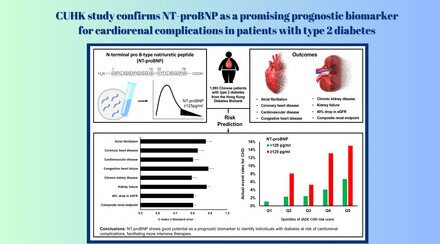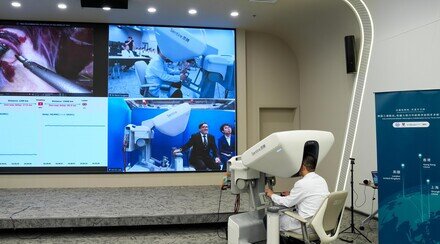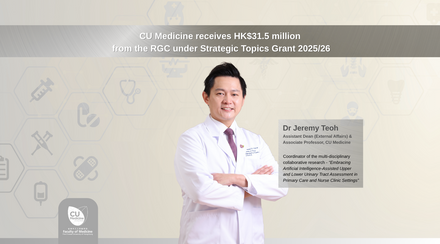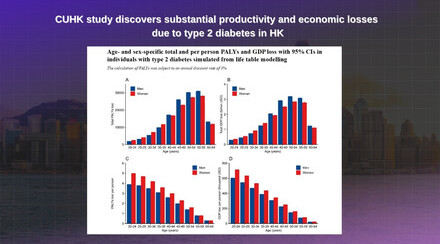CU Medicine joins hands with global experts to develop a Chinese-specific ‘‘type 1 diabetes genetic risk score’’ tool which significantly enhances the accuracy of diabetes diagnosis
A joint research team from The Chinese University of Hong Kong’s (CUHK) Faculty of Medicine (CU Medicine), the University of Exeter from the United Kingdom and the Second Xiangya Hospital of Central South University from China has successfully developed a ‘‘Type 1 Diabetes Genetic Risk Score’’ (C-GRS) tailored for the Chinese population. This novel tool significantly enhances the accuracy of diabetes diagnosis and classification, particularly in distinguishing between type 1 and type 2 diabetes. This groundbreaking study was recently published in the prestigious international journal Diabetologia, bringing new hope to millions of individuals worldwide who may be at risk of diabetes misdiagnosis.

Featured are (from left) Dr. Hu Jingyi, the first author of the study; Professor Xiao Yang, thecorresponding author andDeputy Director of the National Clinical Research Centre for Metabolic Diseases; and Professor Zhou Zhiguang, another corresponding author andDirector of the National Clinical Research Centre for Metabolic Diseases, all from the Second Xiangya Hospital of Central South University, together with two corresponding authors including Professor Ronald Ma Ching-wan, S.H. Ho Professor of Diabetes and Head (Academic Affairs) in the Division of Endocrinology and Diabetes at CU Medicine; and Professor Richard Oram from the University of Exeter, the United Kingdom.
The dilemma of diabetes diagnosis: 40% of patients used to be misdiagnosed
Diabetes, typically classified into type 1 and type 2, is a common chronic disease worldwide. Type 1 diabetes is caused by autoimmune destruction of the cells in the body that produce insulin, and means patients need to inject insulin daily in order to control their blood glucose. Type 2 diabetes is a metabolic disorder characterised by insufficient insulin secretion or reduced insulin sensitivity. The treatments depend on the specific cause, and other factors such as age, weight and genetics.
The incidence of type 1 diabetes has been increasing across various countries and regions worldwide in recent years. According to recent data, it is estimated that approximately 9.5 million people globally are living with type 1 diabetes in 2025[1], with about 500,000 new cases diagnosed each year. In Hong Kong, it is estimated that there are about 5,000 confirmed cases of type 1 diabetes[2], 500 of which are patients below the age of 20. However, up to 40% of individuals with type 1 diabetes were initially misdiagnosed as having type 2 diabetes, a situation more common among Chinese adults. As patients with type 1 diabetes require lifelong treatment with insulin, delayed diagnosis and treatment can lead to serious complications. Current diagnostic methods have limitations, with about 25% of patients unable to be diagnosed through traditional tests.
Professor Richard Oram from the University of Exeter, noted: “A lot of our knowledge of type 1 diabetes has been generated from studies in Europeans and does not apply to people from other regions around the world. This study will directly benefit the potentially millions of people with diabetes in East Asia who may be misdiagnosed, and will also help predict and classify type 1 diabetes more accurately across the globe.”
A Chinese-specific tool for genetic risk scoring
Leveraging established genetic risk scoring methodologies and pioneering technology developed by the University of Exeter, as well as independent validation and analysis by the CU Medicine team, researchers from the National Clinical Research Centre for Metabolic Diseases at the Second Xiangya Hospital of Central South University analysed health data from over 1,300 Chinese patients diagnosed with type 1 diabetes and 2,200 healthy individuals in a control group. The research team successfully developed C-GRS, a tool that comprises 33 genetic markers, encompassing risk loci specific to the Chinese population, such as HLA-DQ subtypes and BMPER, a gene newly identified as being strongly associated with type 1 diabetes in Chinese individuals.
“We are delighted that this collaboration has significantly advanced our understanding of the genetic basis of type 1 diabetes in the Chinese population. By identifying the genetic factors most strongly linked to type 1 diabetes in Chinese, our work has improved the prediction and classification of diabetes”, said Professor Zhou Zhiguang, Director of the National Clinical Research Centre for Metabolic Diseases at the Second Xiangya Hospital of Central South University.
The identified genetic factors for type 1 diabetes in Chinese people were replicated and shown to also identify risk of type 1 diabetes in a separate group of patients in Hong Kong, analysed by a CUHK research team led by Professor Ronald Ma Ching-wan, S.H. Ho Professor of Diabetes and Head (Academic Affairs) in the Division of Endocrinology and Diabetes at CU Medicine. The research team found that the C-GRS achieved accuracy of nearly 90% in distinguishing between type 1 and type 2 diabetes, significantly outperforming European-based scoring tools when applied to Asian populations. This means that approximately an additional 20-40 of every 100 people presenting with type 1 diabetes would get the right diagnosis with the new tool. C-GRS can also be used for the prediction and identification of individuals at high risk of developing type 1 diabetes, particularly those with a family history of type 1 diabetes. In the UK, a test is already commercially available to use for this purpose.
Professor Ma added: “It is very hard to tell from symptoms alone whether someone has type 1 or type 2 diabetes but this makes a big difference to their treatments and blood sugar control. CU Medicine’s research has validated the high accuracy of the C-GRS when applied to patients in Hong Kong, highlighting its critical importance for future implementation across Asia. This innovative testing technology is cost-effective and requires only a single test for diagnosis, representing a leap forward in getting the right diabetes diagnosis. We believe a significant proportion of adult patients diagnosed with type 2 diabetes in fact have type 1 diabetes. We are now evaluating how to incorporate the use of C-GRS into the regular diagnostic workflow of diabetes, with a view to ‘getting the right diabetes diagnosis first time’, which will enhance the standard of diabetes diagnosis and treatment across Asia.’’
Outlook: from bench to bedside
Researchers have kickstarted a multicentre study in mainland China, with a plan to recruit up to 3,000 people across 80 hospitals nationwide who have been newly diagnosed with diabetes. The study will further assess the actual efficacy of C-GRS. If successful, the tool is set to become one of the standard diagnostic approaches for diabetes among the Chinese population and can also be used in other regions of Asia.
Professor Xiao Yang, Deputy Director of the National Clinical Research Centre for Metabolic Diseases said: “We aim to assess the use of this new test in clinical care. We hope this will help people get the treatment they need much faster, avoiding potentially life-threatening complications.’’
The research was funded by the Noncommunicable Chronic Diseases-National Science and Technology Major Project of China, while the research work in Hong Kong was supported by the Hong Kong Research Grants Council Theme-based Research Scheme, the Research Impact Fund and the Research Grants Matching Scheme.























































